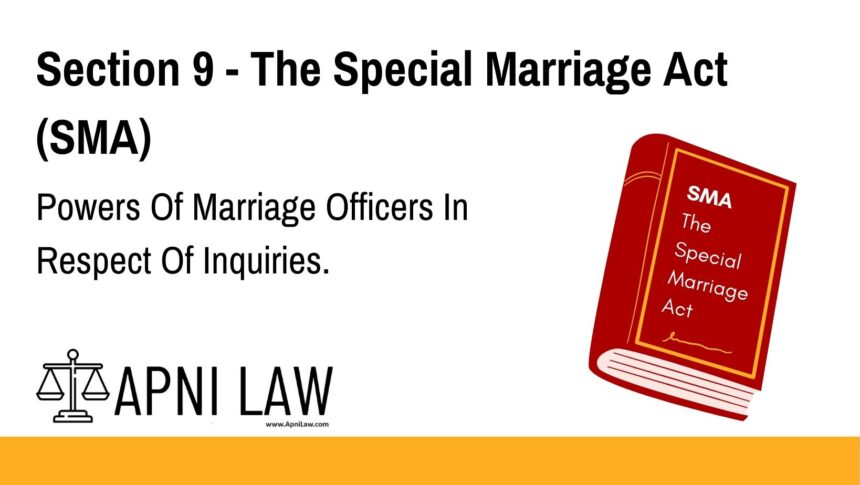Code: Section 9 of the Special Marriage Act, 1954
Section 9 of the Special Marriage Act, 1954, reads:
(1) For the purpose of any inquiry under section 8, the Marriage Officer shall have all the powers vested in a civil court under the Code of Civil Procedure, 1908 (5 of 1908), when trying a suit in respect of the following matters, namely:
(a) summoning and enforcing the attendance of witnesses and examining them on oath;
(b) discovery and inspection;
(c) compelling the production of documents;
(d) reception of evidence of affidavits; and
(e) issuing commissions for the examination of witnesses;
Any proceeding before the Marriage Officer is deemed a judicial proceeding under section 193 of the Indian Penal Code (45 of 1860).
Explanation: For enforcing attendance, the jurisdiction of the Marriage Officer is limited to his district.
(2) If an objection to an intended marriage appears unreasonable or made in bad faith, the Marriage Officer may impose a fine of up to one thousand rupees. He can award the entire or part of the fine to the couple. The order for costs can be executed as a decree in the district court within the officer’s jurisdiction.
Explanation of Section 9 of the Special Marriage Act
Section 9 gives Marriage Officers the authority to act like a civil court when dealing with objections raised under Section 8. This helps ensure that objections are valid and examined thoroughly, with the full power to summon witnesses and demand documents. If an objection lacks merit, the officer can penalize the person making it.
Key Features:
- The Marriage Officer has powers similar to a civil court under the Code of Civil Procedure, 1908.
- Powers include summoning witnesses, receiving affidavits, and compelling the production of documents.
- The Officer’s proceedings are judicial, which means false evidence may lead to penalties under Section 193 of the Indian Penal Code.
- If an objection is deemed unreasonable, the officer can impose a fine of up to ₹1,000.
- The compensation can be awarded to the parties involved in the intended marriage and enforced like a district court decree.
Illustration
Example 1: Exercise of Civil Court Powers
A third party objects to the marriage, claiming one party is already married. The Marriage Officer summons the previous spouse, examines supporting documents, and proceeds with the inquiry. This demonstrates the Officer’s civil court-like powers under Section 9(1).
Example 2: Penalty for False Objection
An objection is raised with no valid reason, merely to delay the process. The Marriage Officer finds this objection is not made in good faith. As a result, he imposes a ₹1,000 fine on the objector and awards the amount to the couple as compensation.
Common Questions and Answers on Section 9 SMA
1. What powers does a Marriage Officer have during an objection inquiry?
The Marriage Officer can summon witnesses, receive evidence on oath, demand documents, and accept affidavits. These powers are similar to those of a civil court.
2. Are these proceedings judicial?
Yes, proceedings before the Marriage Officer are considered judicial. False evidence can result in penalties under Section 193 of the Indian Penal Code.
3. Can a person be penalized for making a false objection?
Yes, if the objection is found unreasonable or made in bad faith, the Marriage Officer can impose a fine of up to ₹1,000. The fine is awarded to the couple.
4. How is the compensation enforced?
The compensation is treated like a district court decree, meaning it can be executed by the district court in the Marriage Officer’s jurisdiction.
5. What is the extent of a Marriage Officer’s jurisdiction?
The Marriage Officer can enforce attendance only within the local limits of his district for summoning and evidence purposes.
Conclusion
Section 9 of the Special Marriage Act ensures Marriage Officers have the legal authority to conduct thorough inquiries into objections. It also provides a means to penalize individuals making baseless objections. This strengthens the marriage process, making it fairer and more transparent.
For more expert insights, visit ApniLaw today.








